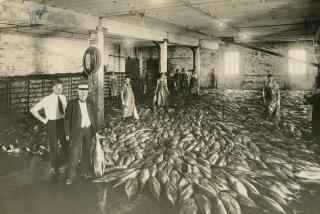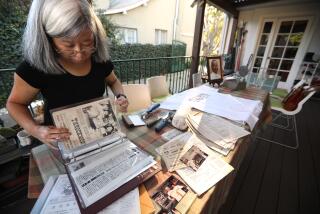Cabbage Key: An isolated travel getaway
The boat pushed away from the dock, eased past the pelican perched on a piling, and looped out into Pine Island Sound. What is it about being on water that makes you feel you’re in Florida?
Useppa Island swam up on our right, buff with houses reminiscent of Seaside, while we swerved left toward Cabbage Key. The Lady Chadwick from Captiva was dropping off passengers, so we sidled next to one of the outer docks. A great lawn rose up to an umbrellaed patio full of families eating lunch. There was something about the scene -- the manicured grounds, the running children, the low-slung building behind -- that made me think of a country club.
I checked in at the marina and then walked up the hill -- an old Calusa shell mound -- into the inn. A waiter in khakis led me through the porch set with tables, down a side corridor and into my room. Then he wished me a pleasant stay.
“And the key?” I asked.
“There is none,” he said. “No need for one.”
Hurricane renovations may have freshened the exterior, but inside the world was still rustic and true. My room was paneled in pine, except where a large fireplace stood. The whitewashed bathroom, with its white tile floor, reminded me of the one in my grandmother’s old house.
I headed to the dining room for lunch. It, too, had an aged look, though the paneling here was dollar bills. They papered the walls and smothered the ceiling, sometimes dangling on strips of masking tape that were coming loose through time and humidity and the breeze created by ceiling fans.
Almost all of the bills carried a name, sometimes with a hometown, written in Magic Marker. Long ago, it’s said, a fisherman at the bar wrote his name on a dollar and pinned it to the wall so that the next time he came he’d have money for a beer, whatever his financial situation. Thousands (the estimates go as high as 70,000) of the more solvent have followed suit. (Fallen bills get donated to charity.)
I ordered a cheeseburger because of another story: that this was the sandwich that inspired Jimmy Buffett to write “Cheeseburger in Paradise.” I got it with a side of potato salad. (Frying potatoes, or anything else, in oil was long seen as a fire hazard, and today the inn still abstains out of a sense of tradition -- and a belief that the scent of burgers should go uncontested.)
After lunch, the owner’s son gave me a tour. Ken Wells moved down from North Carolina after his father purchased the island in 1976; he had grown up here and taken a boat to Pine Island to go to school. Now he lived on the mainland and took a boat to work.
The main building was constructed in the 1930s by the son of Mary Roberts Rinehart, the once-famous, best-selling mystery writer. It became an inn in 1944 when the island was purchased by an artist, Larry Stults, and his wife, Jan. Guests received art lessons from Larry and meals from Jan.
Over time, the inn became popular with fishermen, boaters and other nonconformists. Buffett anchored his sailboat offshore, and the writer Randy Wayne White would come out for parties. You get the feeling that, long before the Las Vegas ad, it was a place where things were done in confidence.
Ken backed the golf cart out, making sure not to hit the turtle. “There are a few on the island,” he said. “They do real well here.”
We puttered down a sandy lane, Ken pointing out some of the seven cottages and the three privately owned houses tucked behind growth. All were here when his family arrived. “We want to keep it the way it was originally.”
He said people often asked if President Bush comes to stay. “I’ve never seen him. I’ve seen his daughter, his brother.”
Down by the marina, he pointed to an egret. “That’s Floyd,” he said matter-of-factly. “Egrets are usually very skittish. But he’ll come up to people and take food from them.”
I thanked him for the tour and walked back to the water tower. Made of wood, it was the only one in the area to survive Hurricane Charley in 2004. Two men from Fort Myers, Fla., were admiring the construction.
“This area is so full of history,” the one man said. “The Colliers on Useppa, the duPonts up in Boca Grande.”
“Back when men were men,” his friend said, laughing. “And there were no taxes.”
“The Cubans called these islands ranchos. They would come up and fish and take the catch back for Lent.”
I walked the nearby nature trail. (Everything on the 100-acre island is nearby.) “Keep your head up,” an employee had told me. “The other day I saw a bald eagle carrying sticks.” I saw mangroves, buttonwoods, live oaks, strangler figs, gumbo limbos, the eponymous cabbage palms, geckos, but no eagles.
Then I went to my room to get ready for dinner.
The island prides itself on its lack of amusements. No tennis courts, golf course, swimming pool, spa. You can rent a boat and go to Cayo Costa, the uninhabited island to the west with a long, patently uncrowded beach facing the Gulf of Mexico. But you don’t have to. “People come here to get professionally bored,” a woman told me when I called to make a reservation. “I tell them sometimes your cell phone doesn’t work out here and they say, ‘Book me!’”
This is the paradox of Cabbage Key. It’s no longer the Hemingwayesque hideaway accessible only by boat. (A lot of guests now are silence-seeking suburbanites -- though they, too, must come by boat.) But the increasingly high-speed connectedness of the outside world steadily magnifies its gift of isolation.
The bar was warm, dimly lit, wallpapered with money -- a rebuttal to the man (Eric Weiner) who wrote that hot climates are death to coziness. Taking a seat, I felt like a figure in a nesting doll, cocooned in a snug bar in the heart of an old inn ensconced on an island surrounded by islands. One of Florida’s great watering holes, ringed by water.
A couple from Brooksville, Fla., was talking to a man I assumed was the owner. The assistant manager had told me that Rob is a great fisherman, a man who knows the currents, the spots, the feeding habits. “We have a fishing tournament,” the man had said, “and the young fishermen come and gather ‘round him. It’s like he’s holding court.”
Rob talked about Buffett and how he’d perform in the bar. “People still come in and play impromptu.” He downplayed the story about “Cheeseburger in Paradise,” saying Buffett had invited him and his wife to a concert, given them seats up front, and then dedicated the song to them. He didn’t know if that meant the song was about his burger.
He said it was hard to keep the place unique. He didn’t advertise, though his sons -- both now in the business -- believed he should. Still, word got around. “Europeans come,” he said, “in the summer. And it’s hot here in the summer -- hotter than in Fort Lauderdale.”
I mentioned he’d been able to keep out development, keenly aware that there wasn’t that much land to develop.
“It’s not about that. It’s about how much you can charge for a cheeseburger.”
He said he hosted a Christmas party every year, attended by fishermen and assorted characters. Homage, I thought, to the old Cabbage Key spirit.
The dining room was nearly empty. The day-trippers had been taken away in boats, leaving me and two couples. It was the slow season, a few weeks before Christmas. I sat at a table next to the screen that looked out on two Cuban laurels. My waitress, Christy, was the same from lunch, though her green T-shirt had been replaced by a white blouse. I ordered grouper and a slice of the frozen Key lime pie.
After the meal I walked outside and climbed to the top of the water tower. The tank platform hid the firmament, but in all directions islands stretched in dark, watery sleep.
More to Read
Sign up for The Wild
We’ll help you find the best places to hike, bike and run, as well as the perfect silent spots for meditation and yoga.
You may occasionally receive promotional content from the Los Angeles Times.






